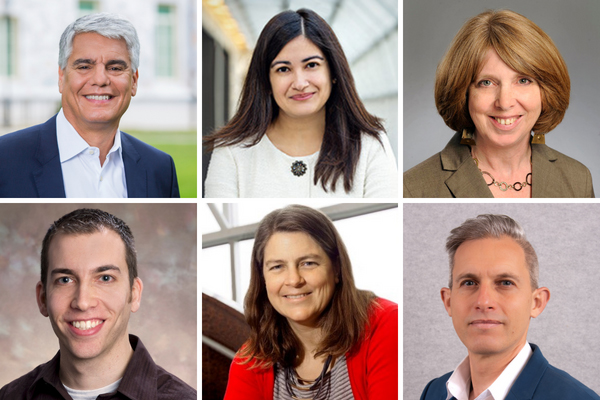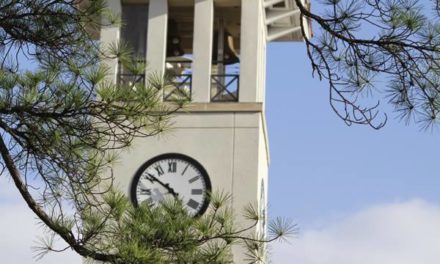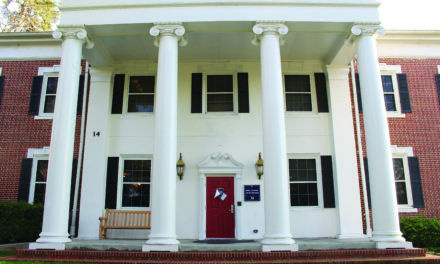The American Association for the Advancement of Science (AAAS) elected six Emory University faculty members to the honorary society in 2022, including University President Gregory Fenves.
“It’s an honor to be inducted as an AAAS fellow alongside five extraordinary Emory faculty members,” Fenves wrote in an email to the Wheel. “We are a destination for eminent faculty who are at the vanguard of their fields, and the new fellows embody the spirit of innovation and ambition that define Emory.”
AAAS, which announced the 2022 fellows on Jan. 31, honors scholars with distinguished scientific and social achievements. It is the world’s largest general scientific society and publishes the journal “Science.”
In addition to Fenves, Samuel C. Dobbs Professor of Biology Anita Corbett, R. Wayne Alexander MD Professor of Medicine in the Division of Cardiology Kathy Griendling, Professor of Medicine in the Infectious Diseases Division David Weiss, Professor of Epidemiology Ben Lopman and Department of Radiation Oncology Chair Reshma Jagsi were named as fellows.
This year’s class will be one of the largest selected from Emory in nearly a century, with one being selected in 2021, and two in 2020.

The American Association for the Advancement of Science selected six Emory faculty members as 2022 fellows. Courtesy of Emory University
Gregory Fenves
Fenves was elected for both “academic leadership” and “contributions to computational modeling and the creation of open-source software for earthquake engineering analysis.” Prior to becoming Emory’s president in 2020, he served as president of the University of Texas at Austin from 2015 to 2020, as well as executive vice president, provost and dean at its Cockrell School of Engineering.
Fenves was also on the University of California, Berkeley faculty for over 20 years, serving as the Department of Civil and Environmental Engineering chair. He is known for pioneering the development of wireless sensor networks for assessing the structural health of buildings, bridges and infrastructure.
Anita Corbett
Corbett acts as a senior associate dean for research at the Emory College of Arts and Sciences, where she supports and promotes research by faculty in the arts and sciences.
She was elected for making distinguished contributions “to the fields of molecular biology and biochemistry, particularly studies of RNA binding proteins linked to human disease.”
Corbett’s lab currently researches the regulation of nuclear protein import and messenger RNA processing and export.
In an email to the Wheel, Corbett noted that she was honored to be one of the AAAS fellows, and expressed gratitude that the organization acknowledged her contributions to building an inclusive science, technology, engineering and mathematics community.
“One is always in good company when one can share the platform with the University president and other outstanding university leaders,” Corbett wrote.
Kathy Griendling
In addition to being a professor of medicine in the cardiology division, Griendling serves as a vice chair for research in the department of Emory School of Medicine and an executive associate dean for faculty affairs and professional development in the medical school.
Her work in researching basic vascular biology has been cited over 60,000 times and has been used in the development of five patents. AAAS recognized her for her “distinguished contributions to the field of physiology and founding the field of vascular NADPH oxidases.”
Griendling wrote in an email to the Wheel that she was honored to be inaugurated into the 2022 class of fellows.
“I have spent my entire career at Emory and share this recognition and success with all my amazing collaborators and trainees over the years,” Griendling wrote.
David Weiss
Weiss is the director of the Emory Antibiotic Research Center and is a faculty member in the Emory Vaccine Center. His research focuses on antibiotic resistance, which he considers to be “one of the world’s greatest medical challenges.” His team strives to increase the utility of drugs by studying the ways bacteria resist antibiotics, which has earned the attention of media outlets.
AAAS awarded Weiss for his research in “the development of methods to detect and treat resistant infections.”
Weiss did not respond to request for comment.
Ben Lopman
As an infectious disease epidemiologist, Lopman focuses his research on diarrheal disease, which kills “on the order of half a million children a year globally,” he said.
Since the onset of the COVID-19 pandemic, Lopman noted that he worked locally, nationally and globally on the epidemiology of the virus. The AAAS cited these efforts, including his study of the epidemiology of enteric diseases and evaluation of vaccination strategies, as reasons for his selection.
Lopman said that though the award was individual, it belonged to more than just him.
“This award really is a recognition of my whole team’s my whole team’s work,” Lopman said. “That includes master’s students, doctoral trainees, postdocs and other faculty members who I work with at Emory, at the Rollins School of Public Health.”
Reshma Jagsi
Jagsi is a bioethicist that specializes in the care of patients with breast cancer. She was elected for her work in “reframing gender disparities as an ethical issue, leading institutions, funders and professional societies to change their policies.”
The radiation oncologist has authored more than 400 articles in peer-reviewed journals, with a focus on the ways women are discriminated against in the medical field. She received grants from several institutions to study women’s role in the medical field after documenting the “gender gap” in the authorship of articles published in major medical journals.
Jagsi did not respond to request for comment.
News Editor | Eva Roytburg (she/her, 23Ox) is from Glencoe, Illinois, majoring in philosophy, politics and law. Outside of the Wheel, Roytburg is an avid writer of short fiction stories. In her free time, you can find her way too deep in a niche section of Wikipedia.





